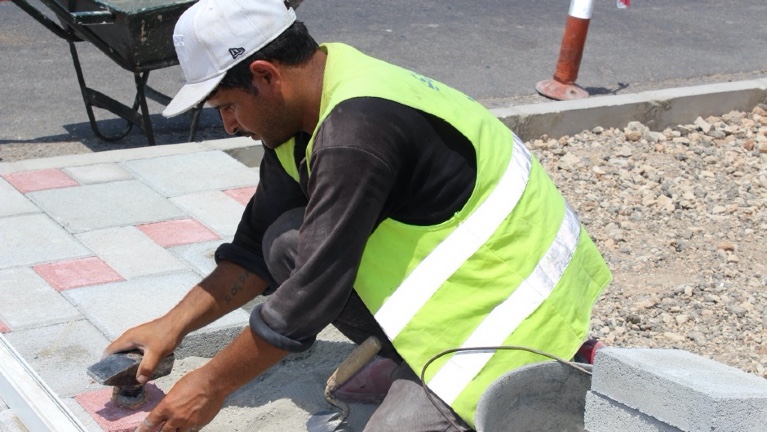Employment Intensive Infrastructure Programme in Lebanon (EIIP)
Creating decent work opportunities for Syrian refugees and host communities through infrastructure improvement in Lebanon.
EIIP Lebanon Phase I+II 31 Jan 2017 - 31Dec 2020 EIIP Lebanon Phase III 01 Jan 2018 - 30 Jun 2021 EIIP Lebanon Phase IV 01 Jan 2021-31 Dec 2023 EIIP Lebanon Phase V 01 Jan 2023- 31 Feb 2025 |
Background
Eleven years into the Syria conflict, the situation in Lebanon continues to exacerbate on the economy, institutions, and people across the country. Lebanon continues to host the largest number of refugees per capita and per square kilometre worldwide1 .To complicate the context even more, since 2019, Lebanon faced an unprecedented and multi-layered economic, financial, social, and health crisis, severely affecting the residents of Lebanon nation-wide. With the current free fall of the economy and skyrocketing inflation, the crisis in Lebanon is most likely to be ranked among the 3 most severe crises episodes globally since the mid-nineteenth century2. The impact of COVID-19 and the related lockdown measures on people’s livelihood, and the additional suffering resulting from the explosion in Beirut Port were dramatic, in particular for the most vulnerable amongst the Lebanese such as daily workers, elderly, women and men living in poverty, female headed households, and people with disabilities.
With support from The German Government through the KfW Development Bank, the ILO has been implementing the Employment Intensive Infrastructure Programme (EIIP) in Lebanon since 2017, creating short- to mid-term employment opportunities for Lebanese host community members and Syrian refugees through infrastructure works. EIIP in Lebanon is currently in its fifth phase, designing projects based on a thorough assessment of the country’s needs in line with the emerging difficulties, in addition to the lessons learnt from previous phases.
The EIIP falls under the livelihoods sector of the Government-led Lebanon Crisis Response Plan (LCRP) 2022-2023, the United Nations Sustainable Development Cooperation Framework (UNSDCF) for Lebanon 2023 – 2025, specifically in line with Prosperity section (relating to SDG 2, 5, 7, 8, 9, 10 and 11), where the goal intended for Lebanon is “Improved resilient and competitive productive sectors for enhanced and inclusive income-generating and livelihood opportunities”.
Target Group
The primary beneficiaries of the project are Lebanese host community members and Syrian refugees in the most vulnerable areas of Lebanon who benefit from temporary employment opportunities through the construction activities. Special attention is paid to equality and non- discrimination and EIIP beneficiaries include women (>20%) and persons with disability (>4%). An estimated 830,000 worker days for some 21,600 beneficiaries have been generated throughout the lifetime of the project.
Programme Objective
Goal: To strengthen resilience of local host communities by improving livelihoods for host community members and Syrian refugees through job creation and infrastructure development.Immediate Objective 1: Employment generated for Lebanese host communities and Syrians refugees through sustainable infrastructure development and environmental works and maintenance of public assets and specific COVID-19 related measures.
Immediate Objective 2: Enhanced capacity for job creation and asset management through institutional development and training. Attaining this:
Main Activities
- Improving the access to decent employment for Lebanese Host Community Members and Syrian Refugees.
- Improving public assets and agricultural production through sustainable infrastructure and green works.
- Building the capacity of private companies to implement LRBT and Decent Work principles for sustainable infrastructure development, maintenance, and green works.
- Building the capacity of the Public Sector to facilitate implementation of employment intensive programs.
- Enhancing the employability of EIIP beneficiaries through on the job training.
- Mainstreaming effective inclusion of Persons with Disabilities across all projects.
- Developing and producing Knowledge products, including workers & perception surveys, tracer studies, surveys into women’s participation and effectiveness of proactive measures, economic impact assessments and lessons learned documentation.
1. LCRP 2022-2023 (2022 update).
2. World Bank Update – October 2021